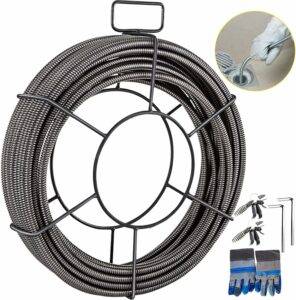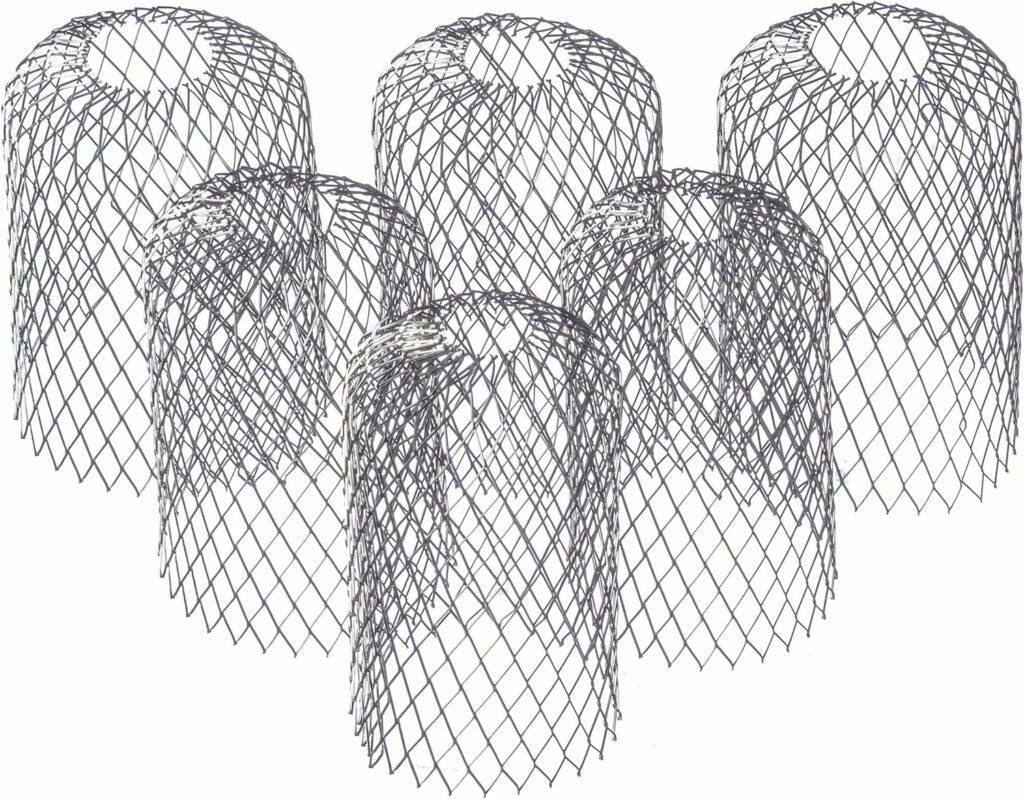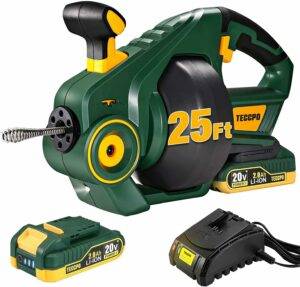There are some easy steps in cleaning your drain instead of calling a professional. First. lets balance the cost: It would cost you around $750.00 to $1,500.00 for simply cleaning your drain. (your bathroom or toilet, or even kitchen sink)
You buying the tools to do this chore; and the time to do it; may cost you less than $200.00 !!! cleaning your drain? PRICELESS!! Also, to think that you will never have to pay for cleaning your drain anymore in the future or making a profession out of this experience? WOW! Listed below are tools you may need for cleaning your drain. Click on icon for prices or to purchase items.
One of many easy steps in cleaning your drain is to use baking soda, with a little vinegar and hot water chaser. Vinegar and baking soda in general make great, inexpensive cleaning products that can be used almost anywhere around your home. For cleaning your drain, simply pour about 1/4 cup of baking soda down the drain, followed by 1 cup of vinegar. Let it sit for 30 minutes or so and then pour hot tap water down the drain to help flush away debris. You might need to try this a couple times if your drain is stubbornly clogged.
Plungers do a great job of cleaning your drain. Contrary to popular belief, they work their magic by pulling the offending item(s) out of your drain, not by pushing them farther in. Just make sure you have a tight seal around the drain opening with the plunger so you can get the suction you need.
8 Things You Should Never Flush- (easy steps to avoid cleaning your drain)
1. Diapers
Yes, people really do try to flush diapers down the toilet, and it’s more common than you might think. Diapers will clog a toilet in a heartbeat, or an outgoing line,thus making it extremely difficult in cleaning your drain. They should always go in the trash.
2. Tampons and Sanitary Napkins
Some experts claim that flushing tampons and sanitary napkins causes the majority of household clogs. The reason is because cotton snags easily, and if your home’s plumbing pipes have any cracks or root infiltration, the cotton can quickly get caught in the line. After a few flushes, buildup can occur and you’ll have a clog on your hands. This gets expensive in cleaning your drain, especially if the clog occurs in the line from your house to the main city line.
Another reason why you should never flush tampons or sanitary napkins is because cotton doesn’t easily break down in water. This could cause some serious problems over time, especially if you’re using a septic system.
Plus, the waste water treatment facility has to remove these items as “solid waste” and tote them to the landfill. These items should go in the trash.
3. Cigarette Butts
This is another item that’s commonly flushed, but won’t ever break down. Trash please!
4. Floss
This is another non-biodegradable item that can quickly lead to clogs if you’re not careful. Like cotton, floss will easily snag on rough pipes.
5. Large Wipes
Baby wipes, paper towels, face wipes, Swiffer pads…all these things might say “flushable” on the box, but if you have even a tiny clog forming; adding large wipes to the waste flow will quickly make a tiny problem big.
6. Toilet Bowl Scrub Pads
Not only are these scrub pads not biodegradable, they’re full of harsh cleaning agents that are difficult for the treatment facility to cleanse from the water.
Best bet? Don’t waste money on these gimmicky cleaners in the first place. Instead, use natural cleaning ingredients like baking soda and vinegar to clean your toilet. That’s what I do and it works great.
7. Dryer Sheets
Dryer sheets are full of toxic chemicals that cause big problems at treatment facilities, and your local water shed. They also can quickly lead to clogs. Your best bet for a healthy home is to not use them. But if you do, don’t flush them after you’re done folding laundry. They’re better off in the trash.
8. Bubble Gums.
Chewing gums are a no, no entering your sewer system. This will cling to side of pipe and eventually build up choking sewer system that can turn out to be very expensive in cleaning your drain.
PATENTED HAIR CATCHER: Read More
The Hairstopper fits most bathtub drains to fit snugly in your tub and keep hair from clogging your pipes. Standard size of 8 x 6 x .5 inches. FAST WATER FLOW: The Hairstopper is able to keep your drains free of hair and debris without blocking water drainage, so your waterflow remains fast and as a consequence, cost you less in cleaning your drain frequently. LOW MAINTENANCE: Just replace every 2-4 months. No need for drain chemicals or treatments for clogged drains. MONEY SAVER: No more expensive plumbing bills to unclog drains. Protect your drain before it gets clogged with hair and debris. Thus prevents cleaning your drain more. EASY TO INSTALL: Simply fit the Hairstopper into your shower drain and allow it to collect loose hair and debris. No difficult installation. No tools needed.
Pack including 5 pack of plastic plumbing snake drain auger. 20″ /52cm.Very flexibleRead More
cleaning your drain and can easily grab & remove clustered hair, food, garbage, and other blockages. Soft enough to bend in many kinds of strainers and pipes, great for kitchen, bathroom toilet & utility sinks, bathtubs,showers, and all possible sinks etc. Great help drain tool for cleaning your drain while unclogging shower and sink , flexes at P-trap where most clogs occurred.60 days money-back & 12-month warranty. Much More environmental and less expensive than toxic chemical drain cleaners.
Features & Details
Read More
【ONE-SWITCH CHANGING DIRECTION】- It is very easy while cleaning your drain to stretch the cable out or shrink it back with one switch in your hand. With the air-activated foot switch, you can literally control the cable with no efforts. 【100′ x 3/8″ WIRE CORE CABLE】- 100′ x 3/8″ premium steel cable resists breakage, tangling, and kinking, corrosion, high hardness and toughness, and it can easily negotiate multiple 90-degree bends. 【OPEN-STYLE CABLE CASE】- The cable machine is made to be open in the cable case, which enables you to clean the machine easily and observe left cable length when using it. 【FOLDABLE HANDLE】- With the handle, it is easy to take it wherever you want. And the handle is designed to be foldable, saving a lot of space when you storage it. Bottom has 2 foot covers to protect floor. 【FOUR SHAPES OF CUTTERS】- Package includes four different shapes of cutters: boring bulb cutter, c-cutter, spade cutter and two arrow cutters for different use. The Tool tray is convenient to store.
Read More
ELIMINATE FOG WITH BREAK DOWN PLUS. Cleaning your drain with this multi-strain bacterial/enzyme solution to eliminate grease, fats, oils starches, proteins, cellulose, and other food waste in your line or grease trap. Enzymes are a safer alternative to sodium hydroxide and other caustic chemicals. ELIMINATE HARSH ODORS FROM GREASE, ETC. In cleaning your drain The bacterial action Break Down and eliminates harsh odors associated with grease traps and lines within a matter of hours. TARGETS FOG, EVEN AS pH DECREASES. Break Down Plus aids in the biological breakdown of organic material inside of drains and tanks. Promotes separation of water phase from FOG phase, thanks to de-emulsifying surfactant. Break Down Plus is biodegradable and safe. MAKES CLEANING YOUR DRAIN EASY. Just pour the proper amount down the drain or in the trap on a routine basis, according to the instructions on the label. That’s it. You don’t have to spend thousands of dollars with a specialty janitorial company in cleaning your drain. With Break Down, the solution is in your hands. GUARANTEED, OR YOUR MONEY BACK. We offer a 30-day money back guarantee on all of our products, because we care about delivering solutions that work. Simply call us for a hassle-free return.
DIRECTIONS:Read More
Drains: Use 2 to 4 oz. weekly. For problematic drains: add 2 to 4 oz. daily to twice weekly. Small to Medium size Grease Traps: Add 8 to 10 oz. daily. Large Grease Traps: Add 18 to 20 oz daily. High Volume Grease Traps: Add 36 to 40 oz daily. Septic Tank Treatment: Troubled Systems, Add 16 to 32 oz. weekly. Maintenance treatment, Add 16 to 32 oz. monthly. Wet Wells, Collection Systems, Sewer Pipes and WWT Plants: Meter 25 to 50 gallons per month into systems.
5/5
Read More
【EFFICIENT & MULTI-FUNCTIONAL】560 RPM and large torque offer strong load-bearing capacity and meet demands of heavy workloads. Easily deal with any situation in cleaning your drain; including kitchen, bathroom, bathtubs, utility sinks, shower drains and downspouts 【FLEXIBLE SHAFT】Dredge drains from 3/4″ – 3″ in diameter by 25Ft (7.5M) steel flexible shaft, which can meet complex needs like “S” and “L” pipes and reach to hard-to-reach places that the traditional tools are not able to. Segmented design allows easier shaft replacing 【EASY-TO-OPERATE】Compared to traditional hand drain augers, MTW 700B has an automatic telescopic function, with forward and reverse rotation and variable speed trigger, which means less work cleaning your drain and easier use 【RECHARGEABLE & PORTABLE】Lithium-ion 20 Volt 2.0Ah battery and 60min fast charging device, making it the most ideal portable tool, able in cleaning your drain that do not have a power source near it IDEAL CHOICE FOR EVERY HOME OWNER 【LED LIGHT & ERGONOMIC】Built-in LED light for increased visibility in enclosed work spaces and dark environment. Rubber over-mold handle provides increased comfort and labor saving during use.
Read More
Includes Lavender essential oil, Frankincense essential oil, Peppermint essential oil, Eucalyptus essential oil, Lemon essential oil, Clove Leaf essential oil, Cinnamon Leaf essential oil & Rosemary essential oil Careful selection of aromatherapy oils in our Essential 8 Collection is based on their individual characteristics and benefits as well as their ability to blend together for your unique aromatic preference and therapeutic needs. Essential oil gift set includes all components of famous thieves blend enabling you to make your own version of the powerful blend. Premium Quality Therapeutic Grade Aromatherapy Essential Oils Set of Top 8; All our oils are pure, natural, unfiltered, undiluted, non-additives, non-fillers; packaged in USA. Amber bottles to filter out light; Multiple Uses: Including Aromatherapy, essential oils for candle making, essential oils for soap making etc. SAFETY WARNING: For external use only. Other than aromatherapy, dilute with a carrier oil. For topical use, rub a very small amount on the inside of your elbow area to test for any allergic reaction before use. Keep out of the reach of pets. Essential oils can be potentially toxic to pets at certain concentrations. Cats can be especially sensitive to essential oils. Avoid contact with eyes, keep out of the reach of children. If pregnant, consult with your health care provider before use.
RIDGE WASHER Sewer Jetter Kit for Pressure Washer, 50 Feet Hose, 1/4 Inch, Drain Jetting, Laser and Rotating Sewer Nozzle, 4000 PSI, Orifice 4.0, 4.5
SHOP NOW
★Read More
Including sewer jet hose, laser sewer jet nozzle (button nose), rotating sewer jetting nozzle, M22 female to 1/4 inch female NPT coupler and 1/4 inch quick connect plug. Working Pressure is rated to 4400 PSI. Burst Pressure is rated to 11000 PSI. ★50 FT sewer jet hose is ISO 9001 Certified and it is made of 3 parts. Inner tube is made of thermoplastic polyester. Cover layer of is made of thermoplastic polyurethane, able to resist oil, weather, ozone, and abrasion. Reinforcement layer is chemically bonded of 1/4 high tenacity polyester textile braid. Sewer jetter hose has a solid end which connects to sewer nozzle. The other end is swivel which releases stress between sewer hose and gun / pressure washer outlet. ★Rotating sewer jet nozzle has 3 backward spouts that is easy to slide into cleaning your drain pipes and sewer lines. The orifice is 4.5. Laser nozzle has 1 front jet and 3 rear jets. The 1 front jet at 0°spray angle engage cleaning your drain and clear blockages and 3 rear jets at 33°spray angle can flush out debris loosened by the front jet. The orifice is 4.0. ★The sewer jetter hose can connect to pressure washer pump with M22 coupler (female M22 to female 1/4” NPT). It can also connect to trigger gun or pressure washer wand with 1/4” quick disconnect plug. ★If you have questions, contact us at any time. We provide a service of quick reply within 10 hours. Welcome to RIDGE WASHER to see other pressure washer accessories.
DEPSTECH Wireless Endoscope, IP67 Waterproof WiFi Borescope Inspection 2.0 Megapixels HD Snake Camera for Android and iOS Smartphone, iPhone, Samsung, Tablet -Black(11.5FT)
With Deal: | SHOP NOW |
You Save: | $7.20 (20%) |



















